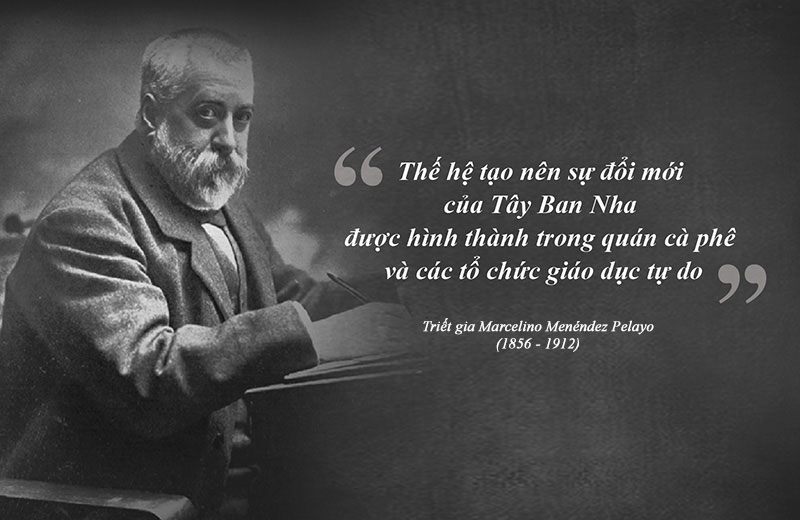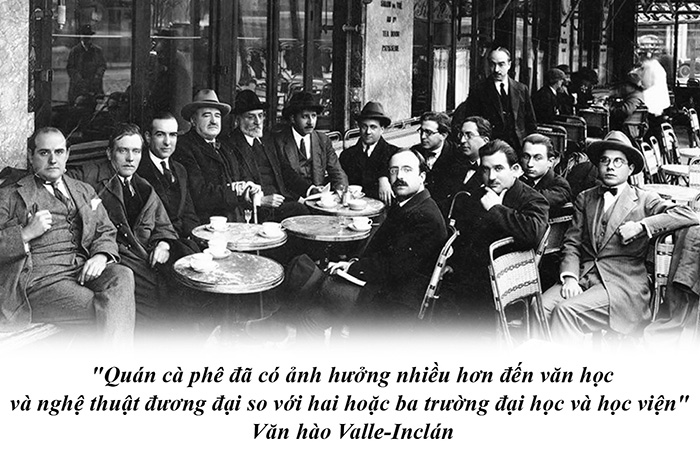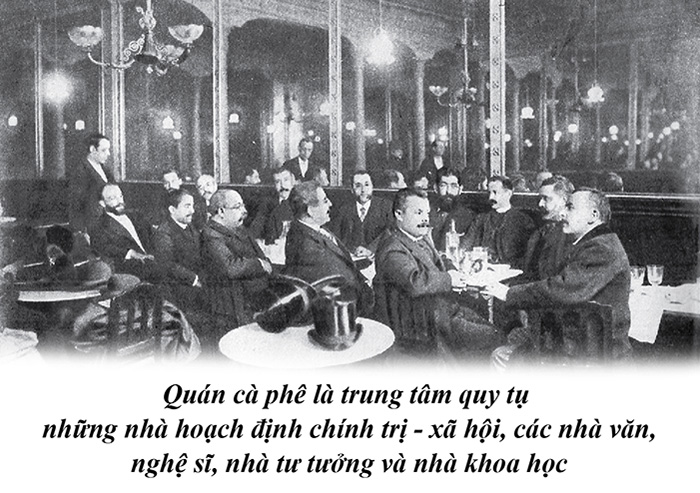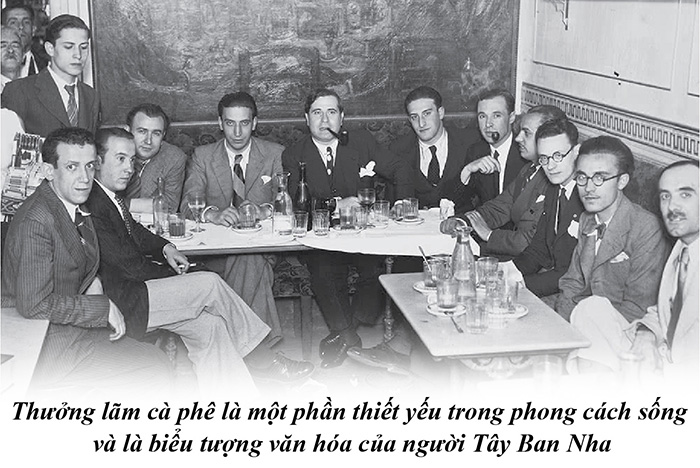Article 44: Cafes – the gathering place of Spanish talent
Introduced to Spain in the 18th century, coffee was soon dubbed the “elixir of the meaning of life”, witnessing the recovery and improvement of Spain’s international position

“The Spanish generation of innovation was born in cafes and liberal educational institutions” Philosopher Marcelino Menéndez (1856-1912)
Aspiration to build national strength
Spain, which was as a matter of fact the first empire called “the empire on which the sun never sets”, reached a period of military superpower, political power and economic peak. But, by the middle of the 17th century, Spain was constantly entangled in civil wars for power and threats from neighboring powers, so Spain was increasingly weakened and lost its position.
In the 18th century, Spain approached Enlightenment thought (also known in Spain as El Siglo de las Luces). Seeing the power of knowledge in solving the problems of the times, transforming thinking and developing the fields of life, the Spanish intelligentsia quickly joined the Enlightenment movement with the ambition to bring the country back to the status of a global empire. The royal family appealed to “patriots” to thoroughly study the great dynasties that existed in the course of Spanish history, extending to educational, scientific, economic, and political achievements of contemporary powers to understand the nature of the path to prosperity.

“Cafés have had more influence on contemporary literature and art than two or three universities and academies” – Writer Valle-Inclán
It was during this period that coffee and coffee shops were introduced to Spain that became the center of the Enlightenment movement, also known as the “Universidad de la Vida”. The cafe was a place where “modern and pioneering” people discuss liberal ideas, innovations that promoted the basic elements that created the overall strength of the country.
Café Fonda de San Sebastián gathered Madrid intellectuals in the fields of science, art, philosophy, etc. to discuss the postulates of Neoclassicalism. These discussions were considered one of the most important activities of the 18th century, contributing to the spread of noble moral values. In Cádiz, the pioneer city of the Enlightenment movement, the growth of coffee shops was called an “extraordinary” phenomenon. In 1788, Cádiz had 35 cafes, becoming a regular meeting place for the new bourgeoisie and elite intellectuals. Public political meetings in cafes had an impact on the promulgation of the first Constitution in Spain (in 1812) and the revolution that led to the Spanish republic in 1873.
Before long, Spain continued to fall into conflict with the colony and confronted the United States in the spring of 1898. The defeat after the battle caused a moral, political, and social crisis in Spain. Before that time, a group of intellectuals “Generación del 98” was formed with typical figures of the era such as Ángel Ganivet, Pío Baroja, Miguel de Unamuno, Enrique de Mesa, Ramiro de Maeztu, Azorín, Valle-Inclán … “Generación del 98” received a mission to overcome the decline and rebirth of Spain, or more specifically, to seek a way to regenerate the nation in proportion to its great past through renewal of living values.

The cafe was a gathering center for socio-political planners, writers, artists, philosophers and scientists.
Coffee shops continue to play the role of centers connecting talented writers, artists, philosophers, scientists, politicians… Café de Fornos, Café de Madrid, Café Lyon, Café de Levante… were the venues for meetings of the “Generación del 98”, the birthplace of literary and artistic works that promoted the building of Spanish dignity and the Spanish-class lifestyle – “Casta Intima”
“Generación del 98” argued that the decline of the empire was due to people’s indifference to social reality, so each person needed to wake up to become an ideal Spaniard – a model in spirit, creative intelligence, strong will to fight for justice and truth, and that was the power to regain greatness for Spain.
From the awakened nation to the prosperous nation
Spain in the 20th century overcame political, economic and social chaos, growing strongly in all spheres of life. The way of life of the Spaniards had changed profoundly, the thought of this period was “sanctifying life”, which is understood as living and working with great thinking in every moment. Thanks to that, in the middle of the 20th century, Spain achieved the miraculous development of “El Milagro Español” – the Spanish miracle. Enjoying the second highest economic growth rate in the world, becoming one of the economic powerhouses, the human development index risen, Spanish culture grew and influenced the world…

Enjoying coffee was an essential part of Spaniards’ lifestyle and cultural icon
The Spanish cafes of the 18th and 19th centuries were a place of awareness of the times, but in the 20th century, they became cultural symbols of the Spaniards in the new era. The Spaniards created a hot coffee called “Carajillo” which comes from “coraje” which means “courage” and would enjoy it every morning to start the day.
Coffee is also the main drink of the day. Up to 87% of the Spanish population between the ages of 18 and 64 consumes coffee daily, on average each person spends more than 230 hours and drinks 599 cups of coffee in a year. Spaniards see coffee as an energy that activates an active and creative lifestyle to be ready to compete with the world. Today, Spain’s creative industries are booming, ranking 5th in Europe. 22% of Spain’s population has become a key resource in the industry, especially in cities with a thriving coffee culture such as Madrid, Barcelona, Valencia… This very “coffee-addicted” population has contributed to changing the national face and enhancing Spain’s position in the international arena.
More than just a drink, coffee is considered by the Spaniards as “Elixir del Significado de la Vida” – the elixir of the meaning of life. Coffee shops have also gathered daily groups of people with great intentions, devoted themselves to the great quest and creating a great future.
THE REAL COFFEE
ROASTED ONLY FOR PEOPLE OF WISDOM!
Source: “The Philosophical Way of Coffee” – copyright by Trung Nguyen Legend


